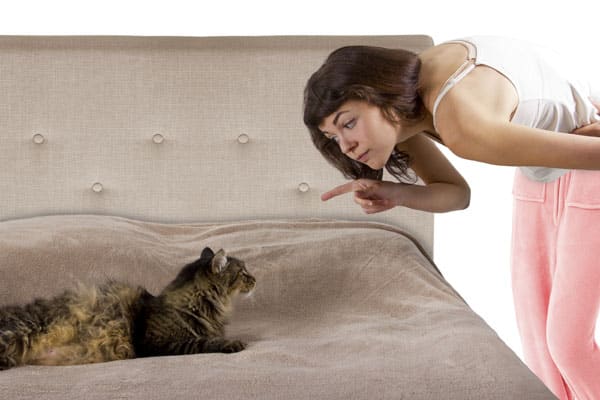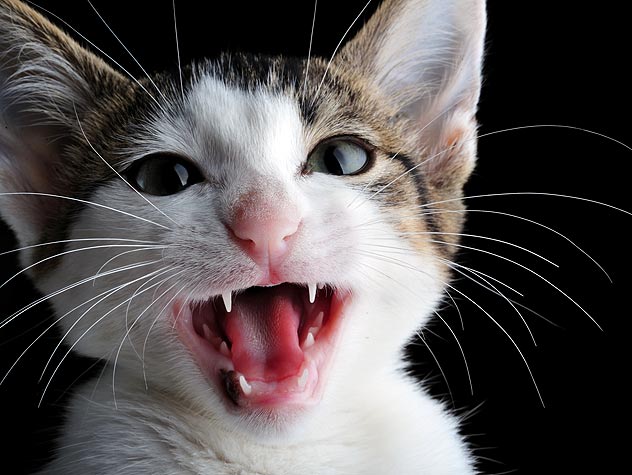

If you are a crazy Cat Lover than this Blog is for you! This Blog was created to share my passion and love or cats. Posts will range from informative Cat Facts, Cat Pictures, Gifs, Videos and all sorts of fun cat-related interests. COMPANION TO: "The Cats MeowSuperstore"our One Stop Online Shop! Thousands of Items at Wholesale Prices.
Search This Blog
Tuesday, September 25, 2018
Cat Talk: 10 Reasons Cats Meow
By: Caroline Golon
According to Arden Moore, author of The Cat Behavior Answer Book, “cats are capable of making at least 30 sounds, including at least 19 variations on the simple meow.”
So why do cats meow? Check out ten possible translations for cat talk:
10) I’m hurt – If your cat suddenly begins to meow excessively, take him to be evaluated by a veterinarian immediately. Your cat’s meows may indicate that there is something medically wrong, especially if the behavior isn’t typical. “Numerous diseases can cause a cat to feel hunger, thirst, or pain, all of which can lead to excessive meowing,” advises Web MD.
9) I’m just saying hi – Often a cat meows to his human when you come home, says the ASPCA website, or even to greet you when you see each other in the house.
8) I want food – The “I’m hungry” meow is likely one all cat parents know well. “Lots of cats know just how to tell their families that it’s time for dinner,” says pet blogger, Jane Harrell. “My cat Mojo would run around after me, meowing the whole time if she thought dinner was going to be late.”
7) Pay attention to me – Sometimes cats talk simply because they want your attention – and they learn that meowing gets them just that. “Cats often meow to initiate play, petting or to get you to talk to them,” explains Web MD.
6) Let me in – “If a door is closed, cats might meow to get you to open it for them,” says Harrell. “I have a foster cat who meows every time I close the bedroom door. She doesn’t want to come in – she just doesn’t like having it closed.”
5) I’m in heat – A female cat in heat might yowl incessantly, says Moore. “Another good reason for spaying!” she adds.
5) I’m in heat – A female cat in heat might yowl incessantly, says Moore. “Another good reason for spaying!” she adds.
4) I’m stressed – According to WebMD, cats who are stressed may become more vocal than normal. You may have experienced this first hand with a cat meowing loudly in the car on the way to the vet, for example.
3) I’m ticked off – “Angry, agitated cats will often erupt into a screaming match if they feel threatened enough to attack,” says Moore. She describes this mad meow sound as more of a yowl.
2) I don’t want to be alone – According to The Ohio State University’s College of Veterinary Medicine’s Indoor Pet Initiative, when some cats are left alone for lengthy periods of time, they may become anxious and, among other things, meow excessively.
1) I’m getting older – “Increased vocalization is fairly common in senior cats,” says Dr. Arnold Plotnick of Manhattan Cats and veterinary expert to catchannel.com. As cats age, Dr. Plotnick explains, they may display a decrease in cognitive function, demonstrated in a variety of ways, including loud meowing.
2) I don’t want to be alone – According to The Ohio State University’s College of Veterinary Medicine’s Indoor Pet Initiative, when some cats are left alone for lengthy periods of time, they may become anxious and, among other things, meow excessively.
1) I’m getting older – “Increased vocalization is fairly common in senior cats,” says Dr. Arnold Plotnick of Manhattan Cats and veterinary expert to catchannel.com. As cats age, Dr. Plotnick explains, they may display a decrease in cognitive function, demonstrated in a variety of ways, including loud meowing.
Of course, as any cat parent knows, sometimes cats meow for some unknown reason. Perhaps because the sky is blue or he wants you to change the channel on the television. Since cats can make a variety of vocalizations, your cat will likely use distinctive sounds in different occasions with different meanings. Paying attention to the circumstances in which your cat meows or vocalizes, and the sounds he makes can be fun and help you understand your resident feline a little better.
Saturday, September 22, 2018
Subscribe to:
Posts (Atom)
21 natural home remedies for cats and dogs
From knocking out fleas and ticks to fighting the havoc of hairballs, these simple, all-natural remedies are both planet and pet approve...

-
From knocking out fleas and ticks to fighting the havoc of hairballs, these simple, all-natural remedies are both planet and pet approve...

1. Your cat peeing on the bed or couch is a sign of a medical problem
2. Urinating in high places feels safe to your cat
3. A cat peeing on the bed or couch indicates issues with the litter box itself
4. Inappropriate urination might signal relationship issues
5. A cat peeing on the bed or couch might have separation anxiety
The final word on a cat peeing on the bed, couch or other elevated surfaces
Read more about cats and peeing on Catster.com: